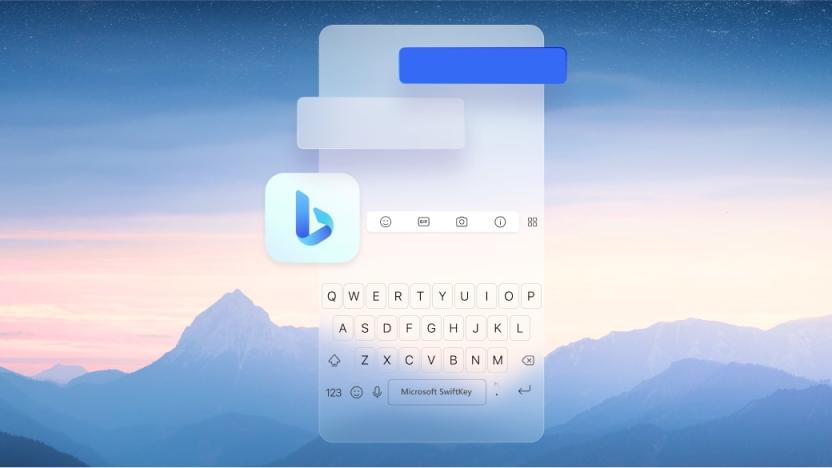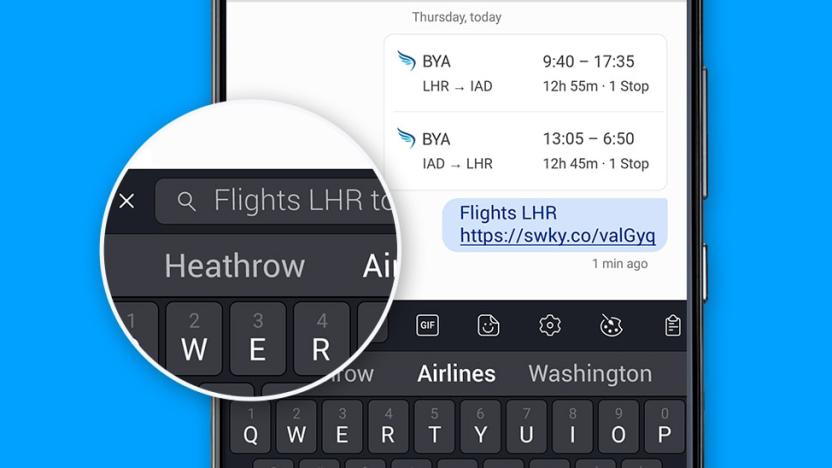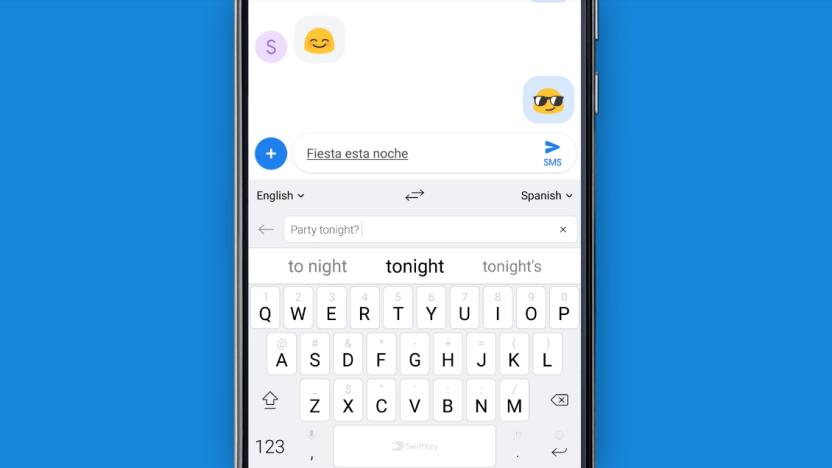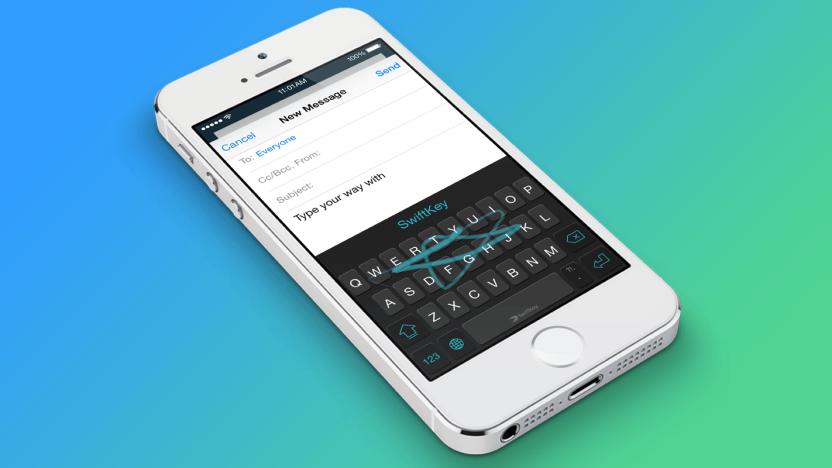SwiftKey
Latest

Microsoft brings Bing's AI chatbot to its iOS and Android SwiftKey apps
It follows Bing's integration into Skype and Microsoft Start.

SwiftKey for Android adds a handy search function to its toolbar
SwiftKey recently gave users the ability to translate conversations without having to leave their apps, and now it's making it easier to search the web. SwiftKey for Android has added a search function, allowing users to search for what they need right from their keyboards. Just open the Toolbar by tapping the "+" on the top left of the keyboard, tap the search icon and type in your search. If you're typing in words, the search function will bring up results from Bing while typing a URL will take you right to that page. You can then share links or screenshots without having to leave your app.

SwiftKey for Android now offers real-time message translation
Microsoft has brought its Translator to SwiftKey, allowing users to translate their conversations without having to leave the app they're in. With an update out today, SwiftKey for Android will translate incoming and outgoing messages in real time and it will be able to do so for over 60 languages. Additionally, while you won't need to install Microsoft Translator to be able to use the new SwiftKey feature, the company says translation will work offline if you do.

Latest Windows 10 test build adds SwiftKey and mixed reality options
Microsoft is giving Windows 10 users a peek at upcoming features, as long as they're brave enough to install the latest Insider Preview build. If you have a touchscreen, you can use SwiftKey, which brings predictive typing and autocorrect from the iOS and Android app's swipeable keyboards into Windows 10. It's available for both US and UK English, along with French, German, Italian, Spanish, Portuguese and Russian -- potentially a dream for polyglots who are taking in the World Cup.

SwiftKey for Android's clipboard is a godsend for lazy typers
So, you don't like typing out your address or any other information you usually send other people again and again -- SwiftKey gets it. In fact, its latest update for Android devices adds a couple of new features you'll enjoy. First is the keyboard's brand new Clipboard, which you can use to save phrases you often use and anything else you want. You can simply copy and paste items you saved onto a messaging or email app whenever you need to.

SwiftKey for Android is now powered by a neural network
From today, the popular keyboard app SwiftKey will be powered by a neural network. The latest version of the app combines the features of its Neural Alpha, released last October, and its regular app in order to serve better predictions. It's the first major change to the main SwiftKey app since Microsoft acquired the London-based company earlier this year. Understanding why the new SwiftKey is going to be better than what came before it requires a little effort, but the real-world benefits are definitely tangible. See, the regular SwiftKey app has, since its inception, used a probability-based language algorithm based on the "n-gram" model for predictions. At its core, the system read the last two words you've written, checked them against a large database and picked three words it thought might come next, in order of probability. That two-word constraint is a serious problem for predicting what a user is trying to say. If I were to ask you to guess the word that comes after the fragment "It might take a," the first suggestion you come up with is unlikely to be "look." But with a two-word prediction engine, it's only looking at "take a," and "look" is the first suggestion. There had to be a better solution. Simply upping the number of words it looks at is impractical -- the database grows exponentially with every word you add -- so SwiftKey's initial solution was to boost its n-gram engine with less fallible, personalized data. If you regularly use phrases, SwiftKey uses that data to improve predictions. And you could also link social media and Gmail accounts for better predictions.

Microsoft's Word Flow keyboard gets a Bing search upgrade
Microsoft's Word Flow keyboard for iPhone just got a significant upgrade this week, adding a search engine for emoji, GIFs, and more from Bing.

SwiftKey leaked user email addresses as text predictions
Autocorrect mistakes are supposed to be funny, but a new SwiftKey glitch turned out to be sort of alarming. For the last week, some SwiftKey users have been offered predictive text for slang they've never used before, words in other foreign languages and, most concerning, email addresses and phone numbers they've never seen.

SwiftKey's first Microsoft-era keyboard predicts your emoji
Wondering what SwiftKey has been up to ever since Microsoft bought it early in the year? It's not necessarily what you'd expect: meet Swiftmoji, a predictive emoji keyboard app for Android and iOS. The software uses both the context of what you're typing and worldwide trends to suggest emoji when you've decided text just isn't enough. They're a bit like iOS 10's suggestions, only with a culturally savvy bent. Swiftmoji will offer "queen" and "bee" if you're raving over the latest Beyoncé single, for example. If you regularly venture beyond the basic emoji, this might save you some time digging through 1,800-plus emoji to find the perfect picture.

One-handed typing is a reality on the stock Android keyboard
Competition is good for everybody. Case in point: Google recently dropped a massive update for the stock Android keyboard that brings in a ton of new features that we've seen from the likes of the now-Microsoft-owned SwiftKey and the Redmond company's multiplatform Word Flow apps. For starters, there's a one-handed mode and quicker access to the number pad and emoji. If you'd rather have a taller keyboard for your phablet now, that's an option as well, in addition to finally having an option for borders on individual keys.

Microsoft is officially acquiring SwiftKey
The rumors were true. Keyboard app developer SwiftKey has been swooped up by Microsoft for an undisclosed fee. The company stresses its apps will "continue to be available on Android and iOS," although as we've seen with Microsoft's other acquisitions -- namely Acompli -- there's a good chance it'll eventually be rebranded or folded into another service. For instance, Microsoft's says it'll be exploring "integration of the core technology across the breadth of our product and services portfolio." That means it's interested in the underlying smarts -- the predictive word suggestions and drag-to-type interface -- as well as the app itself.

Microsoft is reportedly buying SwiftKey (update: official)
Microsoft has made a habit out of acquiring significant mobile app makers, but its next deal may cut particularly close to the bone for smartphone fans. The Financial Times' sources understand that Microsoft is on the cusp of acquiring software keyboard maker SwiftKey for $250 million. The exact intent isn't clear -- Microsoft isn't commenting. However a more advanced input method may be only part of why it's interested.

SwiftKey's latest keyboard is powered by a neural network
A new SwiftKey keyboard hopes to serve you better typing suggestions by utilizing a miniaturized neural network. SwiftKey Neural does away with the company's tried-and-tested prediction engine in favor of a method that mimics the way the brain processes information. It's a model that's typically deployed on a grand scale for things like spam and phishing prevention in Gmail or image recognition, but very recent advancements have seen neural networks creep into phones through Google Translate, which uses one for offline text recognition. According to SwiftKey, this is the first time it's been used on a phone keyboard.

Here are the most popular emojis by state (kind of)
Emoji are insanely popular, despite the near-endless stream of stickers and GIFs that dominate our messaging apps these days. But depending on where you live, some emoji are more popular than others. The folks behind SwiftKey, the predictive keyboard app for iOS and Android, have been mining their community's usage via SwiftKey Cloud to see which icons rank highest across the US. They've come up with an interactive map, but to be clear -- each state's pick isn't based on sheer volume. As a spokesperson explained to Gizmodo: "To identify the 'top' emoji per state, we cross-referenced the list of emoji each state uses more than the US average with the emoji each state uses more than all other states." So there you have it. You might be able to poke a few flaws in the methodology, but it's still fun to see where different emoji are used more often. Georgia really likes the moon, for instance, and Utah has a soft spot for lollipops. Who knew?

Samsung announces a fix for wide-reaching Galaxy keyboard exploit
Samsung is finally responding to a major security bug that affects the keyboards on its Galaxy smartphones and tablets. The security firm NowSecure revealed the exploit earlier this week, which gives hackers the ability to execute code on Samsung's mobile devices. Today, Samsung announced that it's issuing a fix to its mobile security policies over the next few days. The company also stressed that it didn't think the exploit wasn't much of a threat, since it required a hacker being on an unsecured network with your phone. Also, the company's Knox security software offers kernel protection to prevent malicious code from running. Still, this isn't the sort of exploit any company can ignore, especially when a research firm has already detailed exactly how it works.

SwiftKey's new keyboard corrects whole phrases
SwiftKey has a new Android keyboard that will autocorrect entire phrases. Named Clarity Keyboard Beta, it aims to constantly scan the last few words typed in order to offer better corrections than rival apps. Like other SwiftKey keyboards, it'll also learn from your typing style, picking up on your most-used words and phrases.

After Swype, HTC taps China's TouchPal for new Android keyboard
Tech-savvy users may have already come across TouchPal when trying different keyboards on Android and iOS 8 (and maybe even Windows 8), but it looks like a whole lot more people will be introduced to it soon. According to the Shanghai-based keyboard developer, HTC is replacing Nuance's Swype with TouchPal as its new default input engine on upcoming Android devices -- including the recently announced One M9 -- around the world (unless requested otherwise by operators). While HTC wouldn't officially comment on this, an internal source close to the matter verified TouchPal's announcement, though it didn't go into detail as to what prompted the move.

Swiftkey starts predicting emoji for iPhones and iPads
Swiftkey for iOS is but a baby compared to the Android version, but at least its developers are starting to bring more and more features to iPhones and iPads. This latest update integrates (over 800!) emojis right into the keyboard and gives Swiftkey the power to predict the smiley you're bound to use, just like it can predict what word you're going to type next. It does that by learning your typing habits and then adding what it thinks is the appropriate graphic in the suggestion box. In addition, the update adds key click sounds, which you can activate by opening the Swiftkey app and firing up Keyboard Settings > Advanced settings, as well support for 11 new languages.

SwiftKey gets into the holiday spirit with a free new theme
By now you should have completely abandoned the iOS default keyboard in favor of one of the many fantastic third-party options available -- if you haven't, what is wrong with you? -- and if SwiftKey is your weapon of choice you'll find that an app update today has added a good bit of holiday cheer. Getting into the spirit of the season, a new Christmas-y style keyboard has been added for free, complete with a dusting of snow and candy cane key accents. SwiftKey snatched headlines back in September when it scored over one million downloads in less than a day following the iOS update that added third party keyboard compatibility. But despite early popularity, the app holds just a 2.5/5 rating on the App Store thanks largely to reviews that demand additional languages beyond the 24 it already supports.

Stephen Hawking now uses SwiftKey suggestions to communicate faster
Stephen Hawking created some of the most revolutionary ideas in science, but he's very conservative with his communication tech -- right down to the "copyrighted" electronic American accent. He has worked with Intel since 1997 on the assistive computer system he relies on to speak and create documents, since motor neuron disease took his real voice decades ago. Hawking isn't interested in new tech like eye-tracking, but he and Intel recently decided to bring his current text and voice system up-to-date. They ended up getting an assist from a company more familiar to smartphone users -- SwiftKey.













